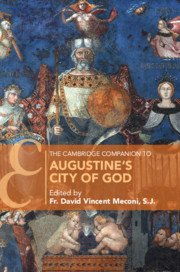Book contents
- The Cambridge Companion to Augustine’s City of God
- Cambridge Companions to Religion
- The Cambridge Companion to Augustine’s City of God
- Copyright page
- Dedication
- Contents
- Notes on Contributors
- Preface
- Abbreviations: Works by Augustine
- 1 Introduction
- 2 Book 1
- 3 Book 2
- 4 Book 3
- 5 Books 4 & 5
- 6 Books 6 & 7
- 7 Books 8–10
- 8 Books 11 & 12
- 9 Books 13 & 14
- 10 Books 15 & 16
- 11 Books 17 & 18
- 12 Book 19
- 13 Book 20
- 14 Books 21 & 22
- 15 Epilogue
- References
- Index
- References
3 - Book 2
Augustine on Religion without Morality
Published online by Cambridge University Press: 21 August 2021
- The Cambridge Companion to Augustine’s City of God
- Cambridge Companions to Religion
- The Cambridge Companion to Augustine’s City of God
- Copyright page
- Dedication
- Contents
- Notes on Contributors
- Preface
- Abbreviations: Works by Augustine
- 1 Introduction
- 2 Book 1
- 3 Book 2
- 4 Book 3
- 5 Books 4 & 5
- 6 Books 6 & 7
- 7 Books 8–10
- 8 Books 11 & 12
- 9 Books 13 & 14
- 10 Books 15 & 16
- 11 Books 17 & 18
- 12 Book 19
- 13 Book 20
- 14 Books 21 & 22
- 15 Epilogue
- References
- Index
- References
Summary
The predominant theme of ciu. Dei 2, which sets the course for Augustine’s critique of ancient Rome, is the disastrous influence of a religion without public moral teaching to offer. In exploring his treatment of that theme, we must first pause over the word ‘religion’, which is ours and not Augustine’s. ‘Religion and morality’ is the way we would naturally pose the question, and more commonly talk about morality without religion than about religion without morality. Augustine could also have expressed his question in our way. He uses the word ritus (plural), sometimes in phrases, as ritus sacri, ritus religionis, in ways that correspond sufficiently to our use of the term ‘religion’, and on one occasion he even refers to ‘religion and morality’ (ritibus moribusque; ciu. Dei 14.1). But he states the question in terms of the conduct of demons, really existing powers that are worshipped as gods in Roman religion, who have failed to provide the city with laws and its worshippers with moral instruction, and who have peremptorily demanded the homage of corrupting theatrical productions.
- Type
- Chapter
- Information
- The Cambridge Companion to Augustine's City of God , pp. 39 - 52Publisher: Cambridge University PressPrint publication year: 2021

